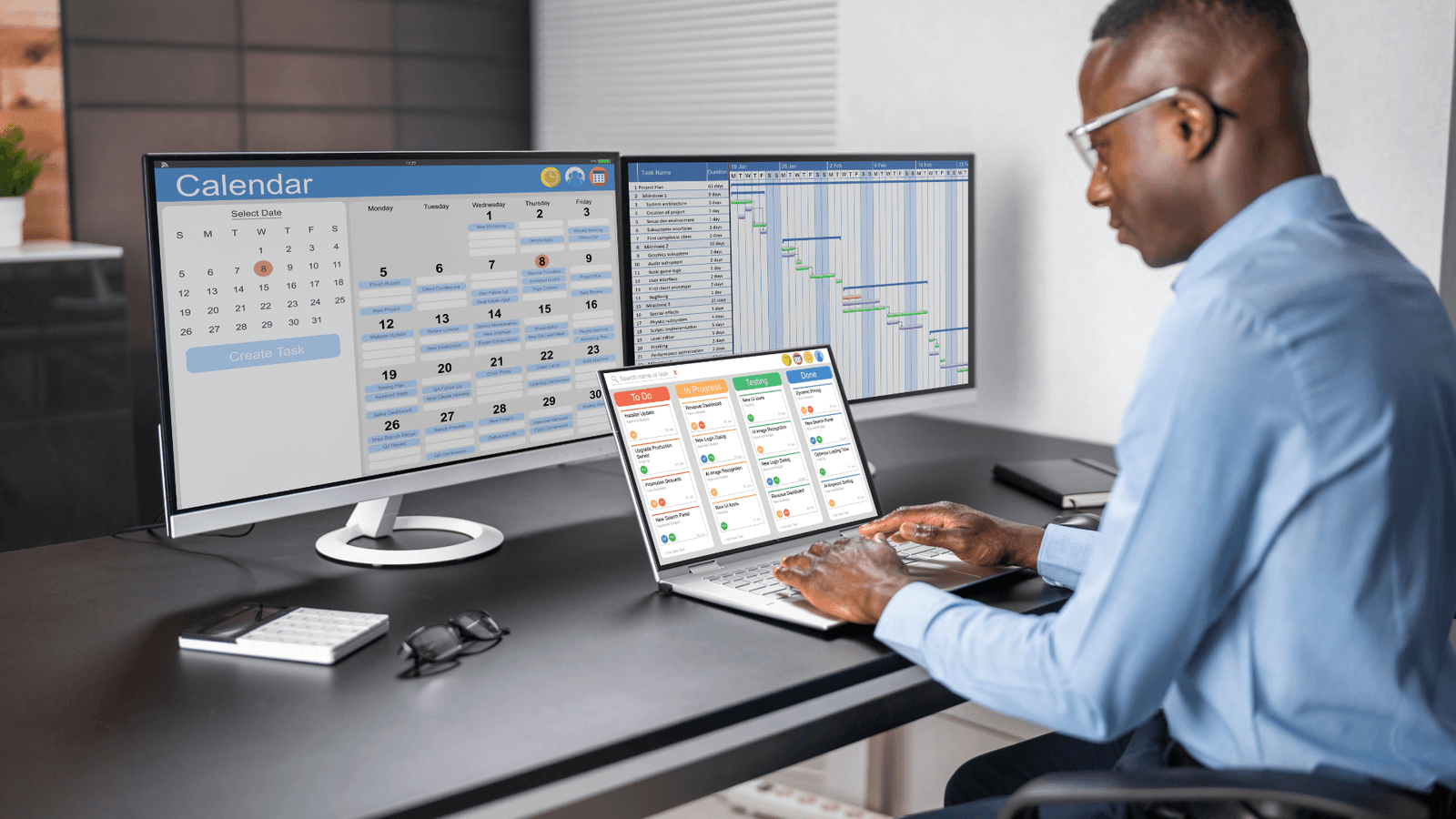In 2025, digital transformation continues to reshape the legal space. With rising client expectations, increasing caseloads, and stringent compliance requirements, legal case management software is becoming indispensable for law firms of all sizes.
Whether you’re a solo attorney juggling client meetings and court appearances or a large firm managing hundreds of cases across departments, the right software can streamline operations, reduce human error, and ultimately boost profitability.
What Is Legal Case Management Software?

Legal case management software is a digital platform that helps law firms organize, track, and manage client cases throughout the entire legal process. It centralizes client data, court documents, deadlines, billing, and communication in one secure location.
Typical features include:
- Contact and case recordkeeping
- Time tracking and invoicing
- Document storage and version control
- Calendar and deadline alerts
- Secure client communication portals
- Workflow automation and task management
- Legal billing and accounting integrations
As legal work grows in complexity, firms need smarter tools to manage information flow. That’s where legal tech steps in, and it’s growing fast. The legal software market is projected to exceed $35 billion by 2030, driven by demand for remote access, automation, and compliance-ready solutions.
Why Legal Case Management Software Is Critical in 2025
Manual legal workflows are becoming obsolete. Today’s clients expect fast responses, secure document handling, and transparent billing. Meanwhile, legal teams face increasing pressure to reduce costs, improve productivity, and remain compliant with evolving regulations.
Here are the top benefits of using case management software:
1. Boosts Efficiency
According to a 2024 report by Gartner, law firms that adopt automation tools report a 30% decrease in administrative workload and 22% higher client satisfaction scores. Features like document auto-fill, task reminders, and email integrations reduce time spent on non-billable activities.
2. Enhances Compliance & Security
Legal data is highly sensitive. With rising cyber threats and global privacy laws (GDPR, CCPA, HIPAA), compliance is non-negotiable. Case management platforms like Clio and Smokeball offer bank-grade encryption, audit logs, and secure backups to safeguard client information.
3. Improves Client Experience
Client portals, automated updates, and seamless communication options make it easier to keep clients informed without constant phone calls or email threads. Tools like MyCase and PracticePanther include mobile-friendly features that clients appreciate.
Top Legal Case Management Software in 2025

With dozens of solutions available, how do you choose the right one? We evaluated today’s leading platforms based on features, user experience, pricing, and integration capabilities.
Comparison Table: Best Legal Case Management Software
| Software | Ideal For | Key Features | Starting Price | Website |
|---|---|---|---|---|
| Clio | Firms of all sizes | Time tracking, billing, integrations, cloud access | $39/user/month | clio.com |
| PracticePanther | Growing firms | Client portal, workflow automation, mobile app | $49/user/month | practicepanther.com |
| MyCase | Small & solo firms | Messaging, eSignature, payment processing | $49/user/month | mycase.com |
| Smokeball | Document-heavy firms | Document automation, AI-powered time tracking | Custom pricing | smokeball.com |
| Rocket Matter | Billing-focused firms | LEDES billing, reporting, integrations | $39/user/month | rocketmatter.com |
Key Features to Look For
When choosing a legal case management platform, prioritize features that meet your firm’s unique needs.
1. Case & Contact Management
Every platform offers this to some degree, but usability varies. Look for an interface that allows fast case lookup, notes logging, document linking, and secure messaging. Clio excels in intuitive matter management.
2. Document Automation
Firms dealing with repetitive paperwork (e.g., real estate or family law) can save hours with document templates and auto-fill features. Smokeball leads in this space, offering 20,000+ prebuilt forms.
3. Time Tracking & Billing
Integrated billing ensures you never lose billable hours. Platforms like Rocket Matter and PracticePanther offer robust time trackers, invoice automation, and compliance with LEDES and UTBMS standards.
4. Calendars and Task Management
Missed deadlines can cost cases—and clients. Look for tools that sync with Outlook or Google Calendar, set automatic reminders, and assign tasks by team. MyCase offers great visibility into team task loads.
5. Secure Client Communication
Avoid unencrypted emails. A modern client portal allows messaging, file sharing, and real-time updates in one secure environment. Clio for Clients offers a seamless experience for both parties.
Cloud-Based vs On-Premise Software

There’s an ongoing debate between cloud and on-premise legal software. While cloud solutions dominate, each has its pros and cons.
Comparison: Cloud vs On-Premise Legal Software
| Type | Pros | Cons |
|---|---|---|
| Cloud-Based | Access from anywhere, lower upfront costs, automatic updates | Requires internet, potential data sovereignty issues |
| On-Premise | Full control over data, may meet strict regulatory needs | High initial investment, ongoing IT management required |
In 2025, most legal tech solutions, including Clio and PracticePanther, are cloud-first. On-premise options are typically reserved for enterprise-level firms with large IT budgets.
Legal Compliance and Data Protection
Case management tools should meet your jurisdiction’s ethical and regulatory standards. Key compliance areas include:
- ABA Model Rules of Professional Conduct
- HIPAA (for medical-related cases)
- GDPR and CCPA (for client data privacy)
Look for providers with SOC 2 compliance, encryption protocols (AES-256), audit trails, and multi-factor authentication. Clio’s compliance page is a good example of what to expect.
Top Use Cases by Firm Type

Different practice areas have different priorities. Here’s a breakdown of which tools suit each:
| Firm Type | Recommended Software | Why |
|---|---|---|
| Solo/Small Practice | MyCase, PracticePanther | Affordable, easy to set up, mobile apps |
| Mid-Size Firms | Clio, Rocket Matter | Scalable, customizable, good billing features |
| Document-Intensive | Smokeball | Best for high-volume document automation |
| Litigation | Clio | Calendar syncing, task management, secure client communication |
| Immigration | Docketwise | Form management, multilingual tools, USCIS integrations |
Questions to Ask Before Choosing Software
- Does it integrate with my current email, calendar, and accounting systems?
- How steep is the learning curve? Is training included?
- What kind of support is available (chat, phone, email)?
- How customizable are workflows and templates?
- Can I export or back up data easily?
Look up the tool on Capterra, G2, or Trustpilot to read verified user reviews.
Legal case management software isn’t just about managing cases—it’s about building a smarter, more agile law firm. In 2025, firms that embrace digital tools not only serve their clients better but also operate more profitably.
Whether you need automation, better billing, or secure communication, there’s a platform for every legal niche. Take advantage of free trials, schedule demos, and involve your staff in the decision-making process.
Because the sooner your firm modernizes, the sooner you’ll experience less chaos, better compliance, and more billable time.

